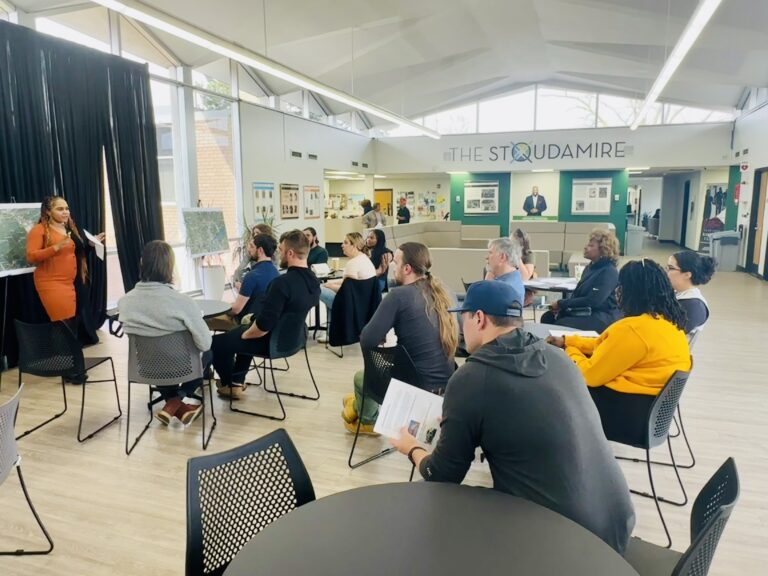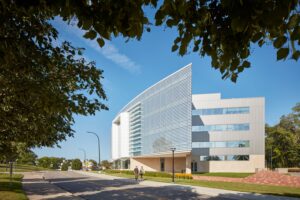
- Kim Kisner
- Community
- 06/04/2024

Elevate is a 24-year-old 501(c)(3) nonprofit focused on creating equitable and sustainable communities. Their areas of focus span energy efficiency, water, workforce development, and creating healthy and efficient homes and buildings in communities.
Part of the work it is doing in Detroit is helping to develop resilience hubs in response to flooding and ongoing climate-related injustice issues. This is part of the Resilient Eastside Initiative (REI), a culmination of residents and organizations including the Eastside Community Network (ECN), The City of Detroit Office of Sustainability, and the Eastside Climate Action Coalition.
Tim Skrotzki, associate director of partnerships at Elevate, and Terri O’Neal, project manager of community programs, talked with SBN Detroit about this work and the role businesses are playing.
Q: What is the impetus behind Elevate?

A: Elevate is a Chicago-based nonprofit formed in 2000 as an energy cooperative focused on energy efficiency and reducing the drag on the grid. We have projects that touch almost all states. Over the past twenty-four years, our work has expanded to include water, solar, electrification, environmental health, and workforce development.
Q: How is Elevate supporting resilient and sustainable communities throughout Detroit and Southeast Michigan?
A: One important initiative is the development of Resilience Hubs on Detroit’s East Side.
Resilience hubs are vital community centers offering education, support, and resources while fostering community connections. These hubs – many of which are small businesses in the neighborhoods – serve as trusted spaces in touch with residents’ needs. They help facilitate coordination of resources and services across various stakeholders before, during, and after climate-related emergencies.
These are being led by the Eastside Community Network and the Resilient Eastside Initiative (REI), a network of 12 resilience hubs on Detroit’s east side, which officially launched in August 2023 in partnership with The City of Detroit Office of Sustainability with funding from the Kresge Foundation.
One of these spaces is The Commons, a café, laundromat, and community space that operates in MACC Development’s storefront space on Mack Avenue. This is a safe space for the community that offers charging stations, resources, and more for neighbors during power outages or emergencies. They are also training and upskilling local residents as a form of workforce development.
Neighborhood Grocery is another hub, offering healthy food access, refrigerators, and charging stations to neighbors during power outages.
This is a framework a lot of businesses can adopt to provide more resources for their communities. It’s an opportunity for businesses to think about where they fit into the community and how they can help the neighborhood remain resilient and sustainable.
Further, part of the funding we received from Kresge is being used for training black contractors in solar and EV infrastructure. Called the Detroit Clean Energy Contractor Accelerator Program, the program helps create growth paths and lift up black and brown contractors to help them build their businesses. We believe that if we develop contractors in clean energy in Detroit they will then hire and train more Detroiters to work with them.

Q: What best practices can you share from the sustainability work you do in terms of the business and community impact?
A: There are federal incentives for businesses and buildings to become more energy efficient. It’s so easy to track what energy you are using and lower it. There are huge opportunities here that people are leaving on the table.
Also, any business looking to grow and be sustainable has to be ingrained in the community. Providing resources that help the neighborhood become more resilient should be on every small business owner’s mind.
Q What are trends you are seeing when it comes to the sustainability that impacts businesses?
A: We are all dealing with new issues we have not dealt with before. Flooding, power outages from 100-year storms, and more.
Making a building more resilient is extremely beneficial to business owners, so they don’t have to reduce hours or close during a flood or power outage. There are new impacts that climate change is driving, and if you are not thinking about how to make your business more resilient you may be losing money.
Also, businesses should be and are becoming more involved in community organizations, meetings, and community engagement. It’s thinking about how they can better meet the needs of the community. Perhaps be a place where people can come during power outages and offer resources to support.
And finally, all businesses should have a climate emergency plan on the operations side of things for their staff, and if applicable, their community.
Be sure to subscribe to our newsletter for regular updates on sustainable business practices in and around Detroit.
Kim Kisner
- All
- Business
- Community
- Education
- Events

ZF Group, a global technology company with its North American headquarters in Northville, specializes in systems for passenger cars, commercial vehicles, and industrial technology. With a focus on next-generation mobility, the company develops solutions that address electrification, automation, and digitalization while aiming to improve safety, efficiency, and sustainability in transportation. SBN Detroit interviewed Anuj Shah, Sustainability Lead, for the Americas, to explore the most pressing environmental challenges in...

The Chip Bag Project, based in Detroit, is a sustainability initiative that upcycles hard-to-recycle snack packaging — particularly chip bags — into insulated sleeping bags for individuals experiencing homelessness. Founded by Eradajere Oleita, the project addresses both environmental waste and housing insecurity by transforming materials like Mylar into practical, thermally efficient solutions. In June, Oleita was among Trelllis’s 30 Under 30, its annual recognition of the brightest young...

PowerPanel, headquartered in Oxford, focuses on sustainable energy technology with a particular emphasis on hot water systems and thermal energy capture. The company designs and manufactures modular solar hybrid systems that integrate both photovoltaic and thermal components into a single unit. Its goal is to offer energy solutions that are more efficient, durable, and economically viable for a range of commercial and industrial applications. SBN Detroit interviewed Garth...







